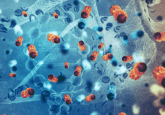Glioma metabolism research indicates potential new avenue for treatment

Researchers from the University of Newcastle (UK) have demonstrated that malignant glioma cells rely on fats for growth. Unlike the previously held belief that cells derive their energy from sugars, the new study indicates that glioma cells take their energy from fatty acids, signifying a new target for future anticancer therapies.
“Patients with malignant glioma currently receive a poor prognosis, and new interventions are desperately needed to increase the survival and quality of life for patients with the condition,” remarked lead author Elizabeth Stoll (University of Newcastle). “Our results provide new insight into the fundamental biochemistry of cancer cells, with exciting implications for patients in the future.”
In the new study, published in Neuro-Oncology, the team utilized mouse models and tissue donated by patients undergoing surgery. They observed that glioma cell growth is slowed when treated with etomoxir, which prevents fatty acid metabolism. This contradicts the previous belief that cells derive their energy from sugars.
“Most cells within the adult brain require sugars to produce energy and sustain function. Interestingly, we have discovered that malignant glioma cells have a completely different metabolic strategy as they actually prefer to break down fats to make energy,” explained Stoll. “Our finding provides a new understanding of brain tumor biology, and a new potential drug target for fighting this type of cancer.”
In their investigations, the researchers isolated stem cells from mice brains and differentiated them into cancer cells with a mutation similar to that in human glioma cells. The differentiated cells were then transplanted into mice with the same genetic background and tumor growth was observed.
Stoll commented: “We tested etomoxir in our animal model, and showed that systemic doses of this drug slow glioma growth, prolonging median survival time by 17%. These results provide a novel drug target which could aid in the clinical treatment of this disease for patients in the future.”
The team aim to carry out further studies to develop the drug in the hope that a new clinical treatment will be of benefit to patients in the coming years. They note that while these findings represent a significant advance in glioma cell metabolism research, this study does not address the influence of diet or nutrition on tumor growth.
Sources: Lin H, Patel S, Affleck VS et al. Fatty acid oxidation is required for the respiration and proliferation of malignant glioma cells. Neuro Oncol. doi:10.1093/neuonc/now128 (2016) (Epub ahead of print); www.ncl.ac.uk/press/news/2016/06/braincancerresearch/



